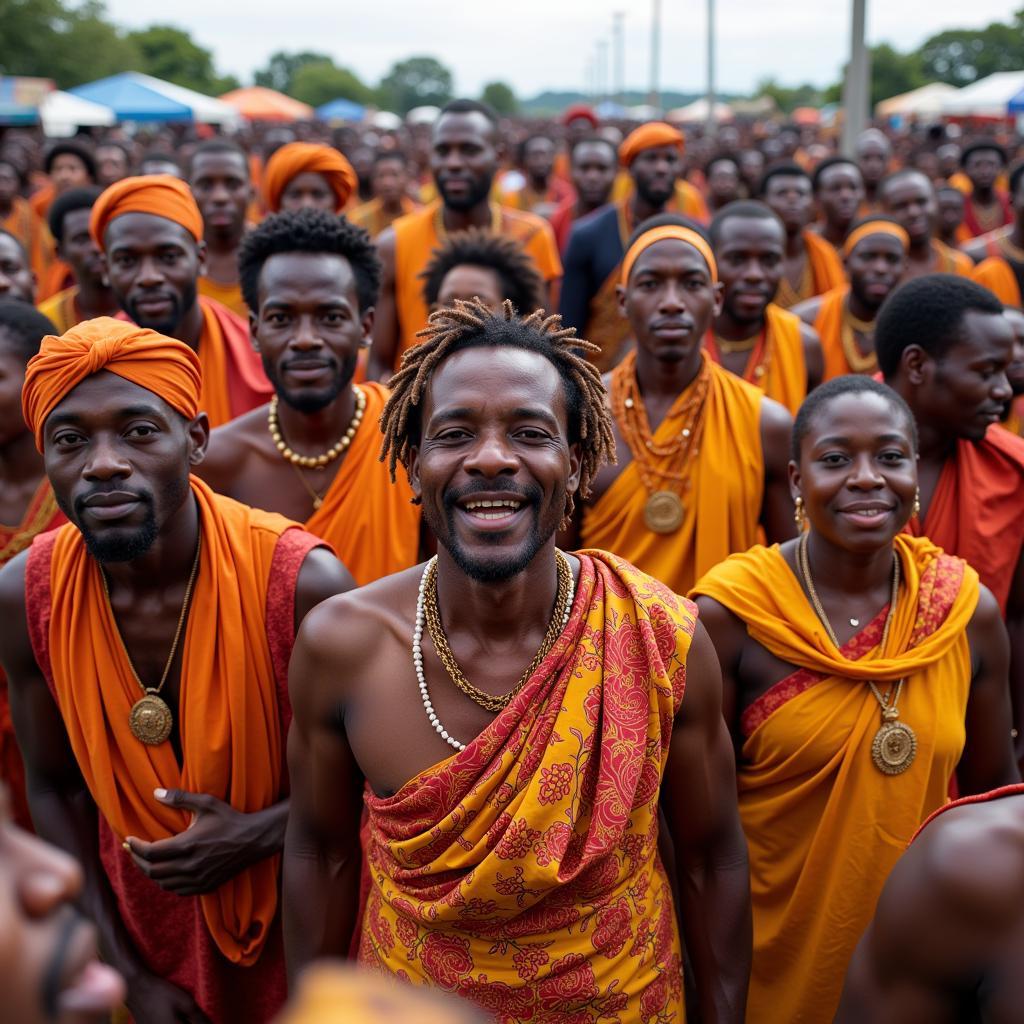Understanding the African Hebrew Israelites: History, Beliefs, and Cultural Impact
The term “African Hebrew Israelites” often sparks curiosity, leading many to wonder about the origins, beliefs, and cultural impact of this distinct group. Rooted in a complex historical narrative, African Hebrew Israelites present a unique perspective on identity, spirituality, and their connection to the African continent and the broader Israelite tradition. This exploration delves into the captivating story of the African Hebrew Israelites, shedding light on their journey, principles, and contributions.
 A gathering of African Hebrew Israelites
A gathering of African Hebrew Israelites
Tracing the Roots: From America to Africa
The story of the African Hebrew Israelites begins not in Africa, but in the heart of 20th century America. Emerging amidst the Civil Rights movement, this group, initially known as the “Original Hebrew Israelite Nation,” found its genesis in Chicago under the leadership of Ben Ammi Ben-Israel. Ben Ammi, originally known as Ben Carter, articulated a powerful message of Black empowerment and spiritual awakening, proclaiming that African Americans were descendants of the ancient Israelites.
This message, resonating with sentiments of Black liberation and a search for identity, attracted a growing number of followers. Driven by their convictions, they embarked on a transformative journey in the late 1960s, first to Liberia and ultimately settling in Dimona, Israel in 1969. This relocation to Africa marked a pivotal moment, signifying a return to the ancestral homeland they believed was their birthright.
Core Beliefs and Practices: A Fusion of Tradition and Innovation
The belief system of the African Hebrew Israelites represents a fascinating blend of traditional Jewish customs and unique interpretations. At the core of their faith lies the unwavering conviction that they are direct descendants of the ancient Israelites, specifically from the tribe of Judah. This lineage, they believe, grants them a special covenant with God and a sacred responsibility to uphold his laws.
Their religious practices incorporate elements familiar to Judaism, including the observance of Shabbat (the Sabbath), adherence to dietary laws (keeping kosher), and the celebration of Jewish holidays like Passover and Sukkot. However, they also integrate unique interpretations and practices, often drawing inspiration from African spirituality and a holistic approach to well-being.
Lifestyle and Community: Embracing Veganism and Communal Living
Beyond their spiritual beliefs, the African Hebrew Israelites are recognized for their distinctive lifestyle choices, particularly their strict adherence to veganism. Long before plant-based diets became mainstream, they embraced this way of life as an expression of their commitment to health, non-violence, and spiritual purity.
Their communal living structure further distinguishes them. Often residing in tightly-knit villages, they prioritize collective responsibility, cooperation, and the well-being of the community as a whole. This emphasis on unity and shared purpose fosters a strong sense of belonging and mutual support within their communities.
Cultural Contributions: Music, Cuisine, and Intercultural Dialogue
Over the decades, the African Hebrew Israelites have made significant cultural contributions, enriching the societies they inhabit. Their musical traditions, blending Hebrew lyrics with soulful melodies and African rhythms, have garnered international acclaim. Similarly, their culinary traditions, emphasizing fresh, organic vegan cuisine, have not only influenced local palates but also contributed to a broader understanding of plant-based diets.
Furthermore, their unique perspective on identity and their journey of cultural fusion have fostered valuable intercultural dialogue. Their story challenges conventional narratives, prompting conversations about race, religion, and the complexities of historical inheritance.
FAQs: Delving Deeper into the African Hebrew Israelites
- What is the relationship between African Hebrew Israelites and other Jewish communities? The relationship between African Hebrew Israelites and other Jewish communities is complex. While they share some common beliefs and practices, there are also theological and historical differences that have led to varying degrees of acceptance and recognition.
- What language do the African Hebrew Israelites speak? In addition to English, the African Hebrew Israelites speak a unique dialect influenced by Hebrew and various African languages, reflecting their cultural blending.
- Are there African Hebrew Israelite communities outside of Israel? Yes, while Dimona, Israel remains their spiritual center, smaller communities of African Hebrew Israelites exist in other parts of the world, including the United States and Africa.
Exploring Further: Unveiling the Rich Tapestry of African Hebrew Israelite Life
From their origins in the American Civil Rights movement to their flourishing communities in Israel and beyond, the African Hebrew Israelites offer a compelling example of cultural resilience, spiritual exploration, and the ongoing search for identity. To delve deeper into their captivating story, explore more about African Israelite tribes or discover insights into the broader context of African Hebrew identity. For a glimpse into the cultural richness of the African diaspora, consider exploring African American names that start with a, unveiling the beauty and diversity of African heritage.
Connect with Us: Embark on a Journey of Cultural Discovery
The story of the African Hebrew Israelites is just one of many captivating narratives waiting to be explored on the African continent. We invite you to continue your journey of discovery with “African Life,” your gateway to the vibrant cultures, rich history, and inspiring stories of Africa. For inquiries or assistance, our dedicated team is available 24/7. Contact us at +255768904061, email us at [email protected], or visit us in Mbarali DC Mawindi, Kangaga, Tanzania. Let us guide you through the wonders of Africa together.


